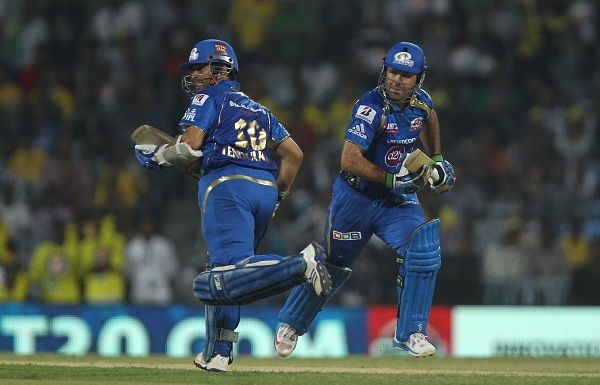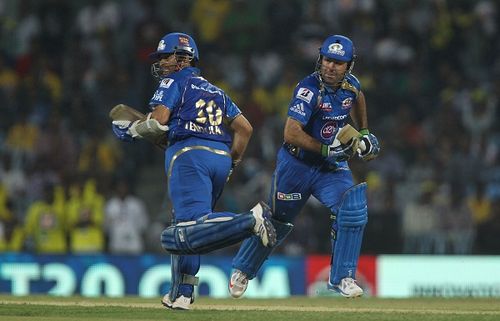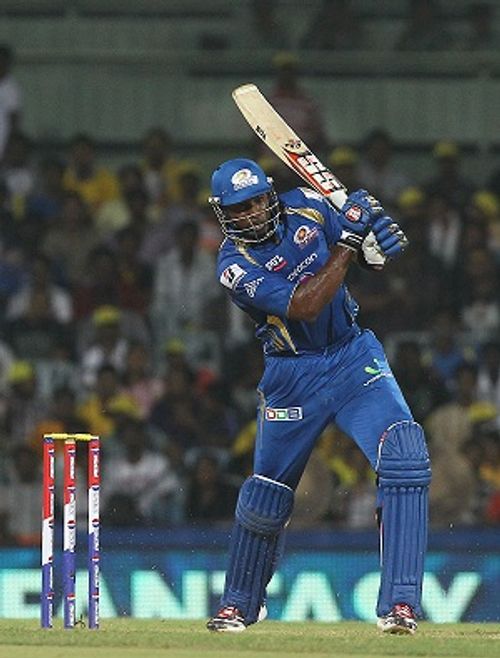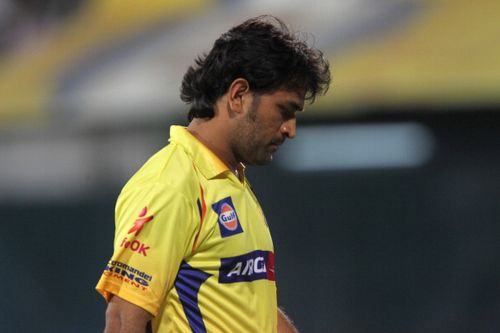
IPL 6: Mumbai Indians vs Chennai Super Kings – A match of tactical blunders
I know what you are thinking. In a way, I am thinking exactly the same thing. It is always easy to point things out on hindsight, isn’t it? But even if it were easy, cricket lovers that we are, taking a few minutes out to read into one of the most high profile matches of the season is still worth it. After all, the match featured two of the most successful captains modern generation has seen. Some of the tactical decisions have been considered more from the point of view of their impact.
Sachin and Ponting opening together

Image courtesy IANS
This is as bad as it gets. For the fans, it is a dream come true. The giant screen showed their international run tally, a mammoth number which the tiny RAM of my brain cannot process. Nevertheless, Mumbai cannot have Sachin and Ponting opening together. When Ponting departed to a mistimed pull, the same shot that once made him the undisputed king on bouncy tracks, MI were 17-2 in the 4th over. Arguably the most expensive team in the IPL, MI cannot afford that. If Sachin has to open, Ponting has to drop himself down to No.3 or No.4. That will give Dwayne Smith a chance to set the tempo. The opening pair has already failed twice and from the looks of it, MI will see chopping and changing at the top this season too, like in the previous one.
Pollard at No.6

Image courtesy IANS
Pollard walked in, in the 9th over. That was more because of Mumbai’s tattering innings than due to Ponting’s astuteness. Mumbai could have won its first match too, had Pollard been sent in, in the 9th over. Instead he was left with just 2 balls to play. MI are almost stubborn about it, bullish stubborn. There are times when you lose track of why you took a decision in the first place and end up following it just to justify the initial decision. Pollard was a big hitter a few seasons ago. But then, Sachin was in prime form. Pollard now, with yesterday’s innings has proved that he deserves to walk in at least No.4, if not earlier.
Nannes bowling the 15th over
Nannes was by far Chennai’s best bowler. Dhoni, who is known for the risks he takes, understandably brought Nannes on in the 15th over when the score was 92/6. His logic obviously was to see if he could get Pollard’s wicket, a wicket that could have meant game, set, match for Chennai. That wasn’t to be. It wasn’t a very bad move but it left Dwayne Bravo to bowl the last. He conceded two 6s, including one off the last ball. Nannes needs to bowl the 20th over, period. He is way too good to be not bowling when the onslaught is most expected. On a parallel track, the wily Ashwin finished his quota in the 18th. The inexperience of Laughlin, who was impressive in the first couple of overs, meant a big over 19th over for Mumbai.
Just Patel and Johnson in the seam department
Ojha came in for Bumrah in this match and returned excellent figures of 2/16. Nevertheless, Mumbai went in with only Johnson and Patel, apart from the dibbly-dobblers from Pollard. Pollard has bowled some good spells in the previous season, but he has had his off days too. Expecting him to bowl the 18th over is a big ask and it almost cost Mumbai the match. Lasith Malinga would walk in for Johnson when he is ready. That will give the bowling some teeth. At this point, the combination of Patel, Johnson and Pollard could be risky for Mumbai if not lethal, especially on better batting tracks compared to Chennai. On seamer-friendly tracks like Mohali, Ojha might still find himself out of the playing XI for no apparent fault of his. One can disagree but it would still be a better bet to share the load between Smith and Pollard, considering Pollard gets too predictable with his easy pace, at most times.
Dhoni at No.6

If Mumbai held Pollard back, Chennai returned the favour in equal measure. Chennai’s best and most reliable batsman walked in at No.6 in the 11th over, when the score was 58/4, very similar to the situation Pollard found himself in. Dhoni however had a steep asking rate to deal with as well, Chennai needing 91 from just 58 balls. That hardly gave him a chance to settle down and in spite of a blitzkrieg innings, Chennai found themselves well short, the last 5 balls of the final over after Dhoni’s dismissal just going for 2 runs. Towards the end, Dhoni found himself virtually alone, one of the consequences of batting lower down the order.